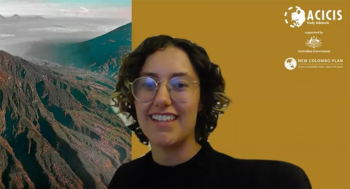By Kate McNamara * (Virtual LPP 2021)
The Australian National University
Selamat siang semua, saya sangat senang bertemu dengan kalian di sini. My name is Katie, and I am dialling in from Canberra, the land of the Ngunnawal and Ngambri peoples, and I would like to acknowledge their ongoing custodianship, their elders past, present, and emerging, and that sovereignty was never ceded.
Thank you to ACICIS for letting me speak a little about how grateful I am for the experience I’ve had and the learning I’ve gained from the Winter Virtual Law Professional Practicum.
I want to speak with you today about the Self and the Other, and how coming to know the Other helps us better know the Self. It sounds a bit like I’m trying to separate the two, but really my goal, and I think the goal of this programme, is to bring them closer together to a better understanding of each other.
Examples of the Self and the Other from my perspective include:
My native language English (the Self) – learning a new language, Indonesian (the Other)
The domestic legal system in Australia (the Self) – Indonesia’s legal system (the Other)
I borrowed the articulation of this idea from Jimena Andino Dorato who is a jurilinguist from Canada. As a law and languages student at the ANU, I was amazed to come across the idea of a “jurilinguist” in my research for my LPP essay. Sure, the concept grew out of Canada where legal bilingualism is a Constitutional requirement, but I thought gosh, this general idea of better understanding the Self through the Other and the Other through the Self has been my experience through immersions and just generally learning about other languages, cultures, and ways of thinking and knowing.
I have been thinking recently that I would like to see different ways of knowing, such as knowing through emotion and language, developed and legitimised in education. This, along with the mentorship of Pran and conversations about how little we know, led me to write a research essay for the LPP on legal education in a globalising and transnationalising world.
I believe the Law Professional Practicum is a fantastic example of legal education that responds to pressures to both professionalise and globalise the study of law. Professional development can be found in the opportunity to intern at a host organisation in Indonesia, while students are also encouraged to challenge themselves by trying to understand the Indonesian legal system, culture, and history through language classes, seminars, and reflective journals.
Cross-cultural learning, I believe, not only benefits students to become leaders that prioritise cooperation, harmony, and understanding, but it also helps learners in the study of their own language and domestic legal systems. It leads us to question why things are the way they are here in Australia: do we have legal pluralism in Australia, why is power concentrated in certain groups of people, what does a separation of powers really do, what does justice look like for different people? I don’t have any answers after this programme, but I do have a lot of questions. And that’s exactly what ACICIS encourages: curious and cross-cultural thinking.
Nearly every time I exited a LPP seminar in the initial three weeks, any knowledge I thought I had about Indonesian society, culture, and legal systems went flying out the window. It took a while and a conversation with Pran to realise that while I found Indonesian society contradictory and complex, it was probably just because I didn’t have the cultural tools to understand, for example, that my broad understanding of corruption encompassed acts that are seen as perfectly legal and a form of social capital in Indonesia.
These kinds of misunderstandings are being addressed by ACICIS’ programmes, hopefully developing students who will problem solve with humility, self-awareness, and a desire to close the gaps between our countries.
I am so glad that we were able to engage with ACICIS even during a pandemic. While I would have loved to visit Indonesia to complete this programme, I know that I will one day anyhow.
Thank you to the New Colombo Plan, without your support most of us would not have been able to access this programme. Thank you very much to all the host organisations, your hospitality and patience allows us to gain professional experience in another country. Thank you as well to Atma Jaya University, Ibu Fitri, your fantastic language classes are the reason why I’m pursuing a minor in Indonesian language at the ANU now. Many thanks go to Sari, Pran, and Helmi for their tireless work administering the LPP, you have gone above and beyond every step of the way for us. You have opened our minds and hearts to Indonesia! Kamu yang terbaik. Terima kasih.
*This was delivered as a speech at the Virtual Practicum Program Closing Ceremony in September 2021.

